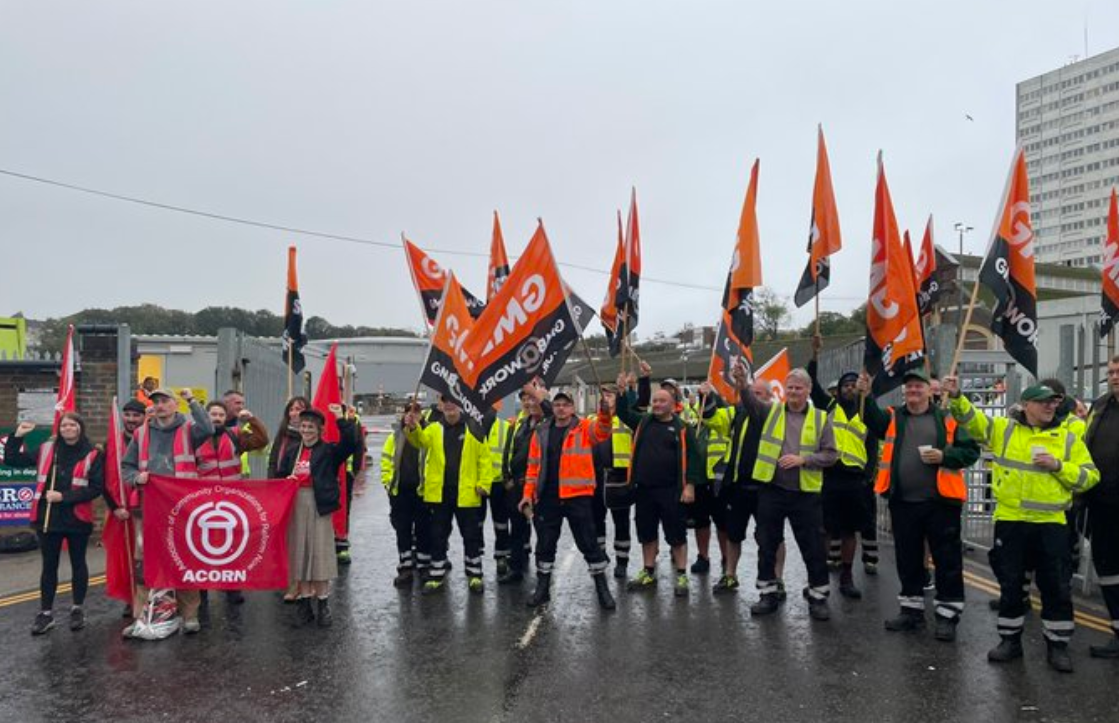Part of the proposals aimed at ending the strike by bin lorry drivers have been published by Brighton and Hove City Council.
The details are set out in a report by chief executive Geoff Raw as he prepares to meet senior councillors at Hove Town Hall at noon today (Wednesday 13 October).
The strike at Cityclean, the council’s rubbish and recycling servce, was called by the GMB union after a ballot of members, with 100 per cent backing from the 80 per cent who voted.
Mr Raw’s report, for a special meeting of the council’s Policy and Resources Committee, said: “There are two distinct elements concerning resolution of the dispute. The first concerns the ballot for industrial action which is primarily about the movement of drivers and allocation of rounds.”
The second element of the dispute concerns pay, which was raised by the council when it aired the possibility of moving bin lorry drivers to a higher pay scale.
The implications of higher pay have not been published. Instead, they have been sent to councillors in a confidential “part 2” report.
In the open “part 1” report, Mr Raw asked councillors to give him a “negotiating steer”.
The report said that the council would consider bringing in ACAS – the Advisory, Conciliation and Arbitration Service – if the dispute continued, or an independent industrial relations expert.
Cityclean’s HGV drivers have been on strike for more than a week because of complaints about round variations, crew changes, variations of duties and the impact on workers’ health and wellbeing.
The ballot paper cited “failures to follow council policies and procedures regarding HGV drivers, and resulting in unilateral decision-making around variations of duties, crew changes, planning for collecting of dropped work and the accumulating resultant effect and toll on drivers’ health and wellbeing and associated issues within the refuse, recycling, com-bins and trades waste.”
After recent talks collapsed, the union extended strike action until Sunday 21 November.

A summary of the offer made on Monday (11 October) set out seven points.
1 Moving drivers because of performance concerns
Managers will invoke formal disciplinary or capability procedures if it is felt necessary to move drivers because of their performance, conduct or capability. Before any formal action, an informal meeting, discussion or standard-setting would take place. Drivers who have been moved will return to their rounds.
2 Ensuring the drivers and their crew go out on the round they are allocated to
Where all members of the crew, the driver and the vehicle are available to work, they will work the round that they are normally allocated to and not be moved to work on a different round. If this does not happen, managers will review the reasons.
3 Covering rounds when reps are on trade union duties
When a driver is released on trade union duties, managers will prioritise cover for their round using pool or agency drivers. When a round is not covered because of a lack of pool or agency drivers, managers will look to provide an additional loader for that round to support with catch up where there is capacity to do so.
4 Prioritising permanent staff over agency workers
Managers acknowledge that drivers are contracted to work from 5am and 7am. Some drivers start work at 6am and on occasion agency workers who also start at 6am have been allocated to rounds ahead of permanent staff who start at 7am.
5 Rounds being changed without consultation or without following the agreed process
Round changes should only happen after a meeting with the crew and union. The meeting will be carried out by operations managers. These managers will be reminded that this must be done prior to any final decision on round changes.
6 Covering a round when drivers are unwell or on annual leave
When a driver is unwell or on annual leave, managers will seek to cover that round using agency or pool drivers.
7 Monitoring and oversight of delivery of these commitments
Officials will provide regular updates to the council’s Environment, Transport and Sustainability Committee about the delivery to the commitments made in this offer as part of the City Environment Modernisation Programme update reports that are presented to committee.
Mr Raw’s report to the Special Policy and Resources Committee said: “This industrial action has affected all areas of the city and is most evident where residents and businesses are unable or have chosen not to retain their waste on their property and premises.
“To reduce the risk of the dispute further escalating while constructive negotiations are in play, the council has sought to minimise flashpoints.
“The council has communicated directly with GMB representatives as the main point of contact and has not publicly issued its detailed offers to affected staff.
“While the dispute and ballot centred around operational matters that managers engaged with the GMB to seek to address, there is now discussion focused on further issues such as pay.
“As is the convention of the council, employer’s policy steers latterly have been sought by the officer negotiating team from the political administration.
“These have been discussed within the context of the council’s own industrial relations policies, protocols, and procedures. More recently, it has been necessary to seek legal and financial advice.”
The meeting, which is due to start at noon today, is scheduled to be webcast on the council’s website.










